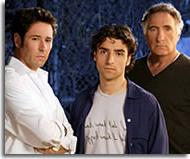



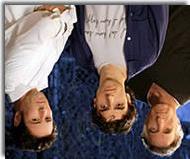
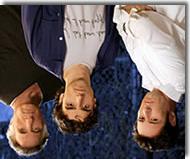
This one really got me riled. Machine versus man, science versus compassion, and logic versus love are all brought forward in this one television episode in a particularly revolting way.
I would wish the perpetrators of the attitudes in this show could live the rest of their lives in a world with these values, but I don't have to. Much of what is wrong with our lives, and most of what has gone wrong recently, is a direct result of them. Our entertainment media have decided to fight a battle of values and they're good at it. With the news media on a similar values campaign, it really is getting hard to tell where reality ends and fantasy begins [1].
This page concerns the "Sacrifice" episode of the "NUMB3RS" television show broadcast on CBS 2005 April 29.
The next few sections go over the plot (so don't read it if you want to watch it first), the Good versus Evil confusion, and the specific travesties of reason in the episode itself. I have other pages with my initial impressions and my later impressions of the "NUMB3RS" television show. I was initially lukewarm and guardedly optimistic, I became disappointed with how the show unfolded, and I was inflamed enough by this one to write a separate page.
The notion of using patterns of prior performance
to forecast future player potential
disturbs the intellectual crowd including
Charlie's mentor, Professor Larry Fleinhardt.
The following conversation
(taken directly from the closed captions)
illustrates his discomfort.
The evil corporate executives he worked for
knew about this work,
but they didn't kill Dr. Hoke.
The government knew about it,
but they didn't kill him, either.
After a confrontation scene where Charlie asks Scott
how he could do such a thing [4]
and a conversation between Charlie and Larry
with some light humor [5],
the show ends with Charlie by himself
staring at a blackboard of equations
trying to figure out the missing step
in Dr. Hoke's research.
Human decisions are more humane than machine decisions.
Who could argue with that?
After all,
human goals are going to be humane, right?
In my twenty-three professional years as an
Industrial Mathematician,
I have seen a some good decisions
and some really awful decisions.
As I did in my
earlier essay,
I'll assert my own
credentials,
decades of quantitative decision-support work.
When a company makes a mistake,
ignores scientific analysis,
and keeps $200 million more inventory than they have to,
somebody
somewhere in their corporate universe
loses $200 million
in wages, earnings, benefits,
or bonuses [7].
Good, scientific, mathematical, logical decisions reward us all.
Then the Hollywood spin doctors make their assertion of evil.
"The Nazis used eugenics to stop the poor from reproducing."
The clear and convincing message,
very well presented to the television viewer,
is that logical, mathematical analysis in Federal funding
is like bringing Dr. Mengele back from the dead
to resume torturing people in the name of medical research.
This confusion of scientific decision making
with inhumane goal setting
is typical in television and cinema
and much of what is wrong with the world we live in.
First,
the kind of statistical accuracy Scott fears simply isn't there.
Like reconstructing a photographic image of an airplane from radar
(in the 2005 May 6 episode),
there just isn't enough information in environmental factors
to predict human performance "down to a city block,"
to make a mathematical determination
who will be and won't be a winner,
or to determine what people are worth investing in.
There is far too much variability from person to person
to get more than trends [8].
If I had that kind of resolution available to me,
then I would use it to get the right people
when interviewing job candidates at work.
Third,
computers are so cheap today, like television,
that anybody who can afford housing can afford a computer
good enough to learn to program [9].
When $400 will buy a complete programming platform,
it's hard to argue for the necessity for public funding
of computer equipment for Scott's education.
Speaking as an industrial mathematician
whose field is represented in the show,
I was initially enthused about the "NUMB3RS" television drama.
As the season wore on
and the episode plots wore thin,
I became increasingly disappointed in where the show ended up.
Episode 11 called "Sacrifice" represents a particularly low point
where abhorrent values are added to poor mathematics.
At the risk of revealing my true feelings
(you never would have guessed),
I am appalled at the values in this episode of "NUMB3RS,"
frustrated at the sloppy logic in it,
and disappointed that a show with this much promise
was used to promote them.
1.
I'm told most Americans believe
professional wrestling is real
and the moon landings were fake.
2.
I only caught the first name Jonas at the end
when Scott Reynolds is ranting about him.
I didn't hear it at the beginning of the show.
3.
Never mind how they got the finger strokes from the computers
or why the FBI wouldn't have a mathematician-consultant
on staff
to do computer forensics.
6.
The sad part of the story
is that both of these individuals were allowed
to continue their careers.
They knew what they were doing
and what choices they were making
and their management knew.
8.
The same paranoia about predicting human potential
was evident upon the publication of
The Bell Curve by Herrstein and Murray.
Most of the book was simple statistical summaries
of how some measurements of human subjects
corresponded with other measurements.
Public response was overwhelmingly negative
as if it were a violation of human decency
to determine which human characteristics
best predicted economic success.
9.
Back in the days
when I went to high school,
when computers were not cheap,
some friends and I called local colleges and companies
and begged for weekend computer time to learn to program.
These business were willing to let us use their facilities,
punched cards and line printers back then,
to learn the programming skills we would later use in our careers.

 Our mathematician hero, Charlie,
finds himself in some kind of moral quagmire
when he investigates the murder of a scientist
working on statistical predictors of human performance.
Our mathematician hero, Charlie,
finds himself in some kind of moral quagmire
when he investigates the murder of a scientist
working on statistical predictors of human performance.
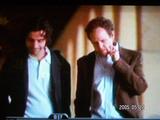 A security-cleared computer scientist,
Dr. Jonas Hoke [2],
is found murdered in his home.
Through a dizzying and fanciful search of his computer's hard disk,
our heroes find files evaluating baseball players
statistically to predict their performance
using a controversial process called "sabermetrics."
A security-cleared computer scientist,
Dr. Jonas Hoke [2],
is found murdered in his home.
Through a dizzying and fanciful search of his computer's hard disk,
our heroes find files evaluating baseball players
statistically to predict their performance
using a controversial process called "sabermetrics."
Larry: Now, did I just hear you say the world "sabermetrics"?
Charlie: Familiar with it?
Larry: The "Money Ball" craze? Oh, yes, I'm familiar with it.
Charlie: I take it you don't approve.
Larry: Well, the notion that human achievement on a baseball
diamond can be predicted through the application of
statistical analysis is, at its very core, highly
problematic.
Charlie: Even if the skill can be statistically measured?
Larry: Yes, because, Charles, the human spirit is im measurable.
You know our brains aren't just these machines, there's a
lot of either/or going on here. Yes, statistical
probability is a wonderful tool, but applied to human
performance it's only an extrapolation of the past.
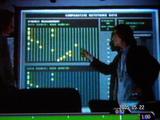 It turns out that baseball is a cover for something more extreme,
using mathematical statistics to predict human performance
based on environmental factors.
This could be used to decide which communities
would benefit from public funding of educational programs
and which would be a waste of taxpayers' money.
It turns out that baseball is a cover for something more extreme,
using mathematical statistics to predict human performance
based on environmental factors.
This could be used to decide which communities
would benefit from public funding of educational programs
and which would be a waste of taxpayers' money.
 Charlie uses sophisticated mathematical analysis
of fingers on computer keyboards
to track down the killer [3]
and figures out that the killer was Scott Reynolds,
Dr. Hoke's young research assistant
who came from a bad neighborhood himself.
He realized that his chances of getting the assistance he needed
in his scientific and computer studies
would have been essentially zero
if this work had reached its fruition.
Charlie uses sophisticated mathematical analysis
of fingers on computer keyboards
to track down the killer [3]
and figures out that the killer was Scott Reynolds,
Dr. Hoke's young research assistant
who came from a bad neighborhood himself.
He realized that his chances of getting the assistance he needed
in his scientific and computer studies
would have been essentially zero
if this work had reached its fruition.
 A recurring theme in "Star Trek"
is Captain Kirk liberating societies
that have been enslaved by computers
posing as gods and prophets.
Mr. Spock occasionally refers to the computer as "logical"
but points out later that doesn't make its decisions "better."
The message is that human decisions,
while often not as well thought out as scientific, machine decisions,
take social aspects into account that machines miss.
A recurring theme in "Star Trek"
is Captain Kirk liberating societies
that have been enslaved by computers
posing as gods and prophets.
Mr. Spock occasionally refers to the computer as "logical"
but points out later that doesn't make its decisions "better."
The message is that human decisions,
while often not as well thought out as scientific, machine decisions,
take social aspects into account that machines miss.
 The next leaps of faith,
if one's reasoning is misguided enough,
are (1) that machine decisions are worse because they're logical
and (2) that scientific decisions are cold and calculating
while human, seat-of-the-pants decisions are warm and comforting.
The next leaps of faith,
if one's reasoning is misguided enough,
are (1) that machine decisions are worse because they're logical
and (2) that scientific decisions are cold and calculating
while human, seat-of-the-pants decisions are warm and comforting.
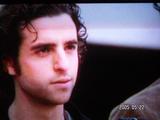 Let me assure anybody and everybody
that decisions made in the absence of logic and science
are absolutely, positively NOT more humane or more caring
than quantitatively informed courses of action.
They're just stupid instead of smart.
I can think of specific people I worked for
whose decisions to reject mathematical analysis
cost thousands of people their
jobs [6].
Let me assure anybody and everybody
that decisions made in the absence of logic and science
are absolutely, positively NOT more humane or more caring
than quantitatively informed courses of action.
They're just stupid instead of smart.
I can think of specific people I worked for
whose decisions to reject mathematical analysis
cost thousands of people their
jobs [6].
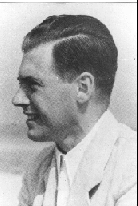 Let's look at Scott Reynolds explanation
for killing Dr. Hoke.
He says he grew up in West Oakland,
a bad neighborhood, lots of minority people, not much going for it.
He accuses the mathematical analysis
of taking away a person's chance at life,
taking away someone's hope.
"What would Dr. Hoke's formula have said
about putting a computer lab in my high school?"
Let's look at Scott Reynolds explanation
for killing Dr. Hoke.
He says he grew up in West Oakland,
a bad neighborhood, lots of minority people, not much going for it.
He accuses the mathematical analysis
of taking away a person's chance at life,
taking away someone's hope.
"What would Dr. Hoke's formula have said
about putting a computer lab in my high school?"
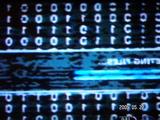 In the face of such an offensive moral posture,
I feel it's appropriate to look at the logic
of this episode piece by piece.
(No more Mr. Nice Guy.)
In the face of such an offensive moral posture,
I feel it's appropriate to look at the logic
of this episode piece by piece.
(No more Mr. Nice Guy.)
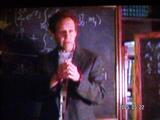 Second,
this is potentially going to affect public funding of schools
in the TV plot.
Public funding is money taken by forcible taxation
from one community of people and given to another.
Scott's outrage is not that he is being denied something he earned,
or something his family earned,
but rather a claim on the hard work of another person
who is being taxed to provide resources
Scott's own community refuses to pay for.
Second,
this is potentially going to affect public funding of schools
in the TV plot.
Public funding is money taken by forcible taxation
from one community of people and given to another.
Scott's outrage is not that he is being denied something he earned,
or something his family earned,
but rather a claim on the hard work of another person
who is being taxed to provide resources
Scott's own community refuses to pay for.
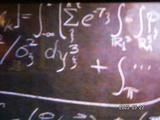 Fourth,
if this mathematical logic were so darned good,
then surely it would find Scott's potential,
a "diamond in the rough" so to speak.
If Scott is going to complain about a technology
being so good that it can make a perfect decision
about his own neighborhood,
then he shouldn't base his entire argument
on the expectation that the technology will be wrong about him.
Fourth,
if this mathematical logic were so darned good,
then surely it would find Scott's potential,
a "diamond in the rough" so to speak.
If Scott is going to complain about a technology
being so good that it can make a perfect decision
about his own neighborhood,
then he shouldn't base his entire argument
on the expectation that the technology will be wrong about him.
 Fifth,
the mathematical, logical, scientific analysis
that Scott fears would reject him and exclude him
from the society of technology and engineering
would have excluded a murderer.
That he is willing to kill to protect his turf
suggests that any system that keeps him away
from the productive sector of computing
is doing the right thing anyway.
Scott kills to prevent a wrong to protect a right
that his willingness to kill proves he should not have.
Fifth,
the mathematical, logical, scientific analysis
that Scott fears would reject him and exclude him
from the society of technology and engineering
would have excluded a murderer.
That he is willing to kill to protect his turf
suggests that any system that keeps him away
from the productive sector of computing
is doing the right thing anyway.
Scott kills to prevent a wrong to protect a right
that his willingness to kill proves he should not have.
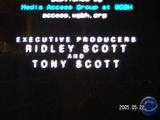
6:37:10 Mountain Standard Time
(MST).
523 visits to this web page.
Scott: What'd you want?
Charlie: I'm trying to figure out how you could kill a man.
How you could kill a fellow scientist, to steal his work.
Scott: Is that why you think I killed Dr. Hoke? For money?
Charlie: You weren't jealous of his accomplishments.
Scott: His accomplishments. Is that was you call them? I grew up
in West Oakland. Anyone I grew up with, who isn't dead or
in prison, is flipping burgers or driving a truck. And it's
not too difficult to guess what Dr. Hoke's formula would
have said about putting a computer lab up in my high school.
That computer lab saved my life. And next year it's going
to save somebody else's.
Charlie: And killing Dr. Hoke accomplishes that?
You think it stops there.
Scott: Well in the last century, the Nazi's use the theory
of eugenics, to stop the poor from reproducing.
Eventually they justified just killing the sick ones.
Charlie: You can't compare that to this-
Scott: Actually that's a perfect comparison cause what Jonas
was doing, was taking away a person's chance at life.
It's taking away someone's hope, and I did what I had to do
to stop that before it started.
Charlie: That makes you a murderer.
Scott: Have you ever thought about your own work?
Charlie: . . . What about my work?
Scott: Well you consult for the NSA, don't you? (Charlie slightly
nods.) Ahh, of course you do. So you gonna tell me that
everything you do will be used for good, all the time.
Charlie: What's your point?
Scott: Well you're asking me how I'm gonna live with myself. . .
look in the mirror. Ask yourself the same question.
Larry: It was that old saying; applied physicists are from Venus,
theoretical physicists . . .
Charlie: . . . Wonder why it rotates in the opposite direction.
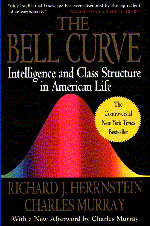 7.
The financial loss isn't in executive pay or bonuses.
The folks who take the penalty for bad decisions
are seldom those who actually make them.
7.
The financial loss isn't in executive pay or bonuses.
The folks who take the penalty for bad decisions
are seldom those who actually make them.